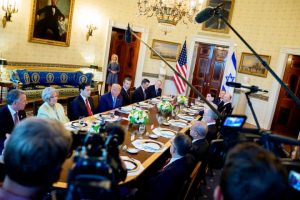Israeli Prime Minister Benjamin Netanyahu has said he has nominated Donald Trump for the Nobel Peace Prize, as the two leaders held talks in Washington against the backdrop of ongoing conflict in Gaza and renewed hostilities with Iran.
Meeting for the first time since the United States launched airstrikes on Iran’s nuclear facilities during a brief but intense flare-up in the Israel-Iran conflict, the pair discussed a range of pressing issues including ceasefire efforts in Gaza, the humanitarian toll of the war, and negotiations with Iran and Hamas.
During their meeting at the White House on Monday evening, Netanyahu presented the former US president with a letter he claimed to have submitted to the Nobel committee.
“I want to express the appreciation and admiration not only of all Israelis, but of the Jewish people,” said Netanyahu. “You deserve it.”
“Coming from you in particular, this is very meaningful,” Trump replied.
It marks the second such nomination for Trump in recent weeks, following a similar announcement by Pakistan last month.

The meeting comes amid mounting pressure on Israel to end its 21-month-long military campaign in Gaza, which has reportedly killed nearly 60,000 people, the majority of them Palestinians. Trump was expected to urge Netanyahu to consider a ceasefire, amid growing international outcry over the humanitarian crisis.
Earlier in the day, Israeli and Hamas negotiators held indirect talks in Qatar, their first in six weeks. While both sides struck an optimistic tone, key sticking points remain. Among them: Israeli assurances that the war would not resume, and Netanyahu’s continued demand that Hamas be removed from Gaza entirely.
When asked at a dinner in the White House’s Blue Room whether Palestinians should be forcibly removed from Gaza, following reports that Israel plans to relocate Gaza’s population to a camp built on the ruins of Rafah, Trump sidestepped the question and passed it to Netanyahu.
“It’s called free choice,” Netanyahu responded. “You know, if people want to stay, they can stay, but if they want to leave, they should be able to leave.
“It shouldn’t be a prison,” he added. “It should be an open place and give people a free choice. We’re working with the United States very closely about finding countries that will seek to realise what they always say they wanted, to give the Palestinians a better future. And … I think we’re getting close to finding several countries.”
Netanyahu is currently wanted by the International Criminal Court for alleged war crimes relating to Israel’s campaign in Gaza.
On Iran, Trump said he “hoped” further US strikes would not be necessary. “They want to work something out,” he said. “They’re very different now than they were two weeks ago.” He declined to confirm when new talks with Tehran would begin, but promised updates on Tuesday.
Addressing Russia’s invasion of Ukraine, Trump adopted a firmer stance than in previous remarks. “I’m not happy with President Putin at all,” he said. “I’m disappointed, frankly, that President Putin hasn’t stopped.”
Trump added that the US would resume some weapons shipments to Ukraine, despite a recent White House pause due to low munitions stockpiles. “They’re getting hit very hard now… We’re going to have to send more weapons.”
He also claimed that Hamas was “interested in a ceasefire”, but offered no details. When pressed about a two-state solution, Trump again deferred to Netanyahu, who reiterated Israel’s position that while Palestinians may govern themselves, Israel would retain control over security.
“I think the Palestinians should have all the powers to govern themselves, but none of the powers to threaten us,” Netanyahu said.
Despite the impasse, he expressed optimism. “I think we can work out a peace between us and the entire Middle East with President Trump’s leadership,” he said. “I think we can establish a very, very broad peace that will include all our neighbours.”
Before leaving for Washington, Netanyahu had insisted that Israeli negotiators were under strict orders to secure a ceasefire but only under conditions previously outlined by the Israeli government.
Sources close to the Israeli delegation described the Qatar talks as “positive”, while Palestinian officials offered a more cautious assessment, saying preliminary meetings had yielded no concrete progress.
Netanyahu also held meetings with US Middle East envoy Steve Witkoff, Secretary of State Marco Rubio, and is expected to meet Vice President JD Vance and House Speaker Mike Johnson during his visit.



